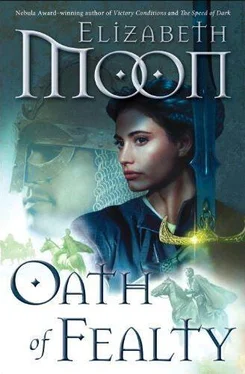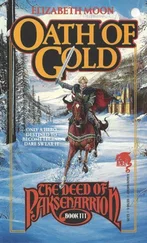“There you are! I must conduct you to the prince’s dining hall for luncheon, and on the way, explain the details of tomorrow’s ceremonies. You will need—” He looked at Dorrin. “—you will need a ducal robe—do you have one?”
“Yes,” Dorrin said, stretching her legs to keep up with him, and trying at the same time to understand where in the massive pile she was. “I do—you mean the long one with fur at the cuffs?”
“Yes. And shoes, not boots. Your sword will do, but it must have a tassel, in silver, the length of your hand; if you do not have that, you should seek out the royal outfitters in Bridge Street. Short breeks, tied at the knee with ribbons of your family colors, with a rosette. The shirt to be adorned with lace—wider than that on your shirt today. A velvet cap, with a feather—silver pheasant is best.”
He kept on, all the way down a set of stairs Dorrin was sure she had not seen before, then announced her at the door of a room that overlooked the front courtyard. After a moment, she recognized it from the evening before, but now the long table was covered with a green cloth, centered with bouquets of roses, cream and pink and red and yellow, their scent filling the room. Besides the prince and Duke Mahieran, she saw other men and women in the dress of nobles … by the colors and insignia, this was the Regency Council.
“Be welcome, Duke Verrakai,” the prince said. One by one he called the others forward to introduce her. Dorrin knew Marrakai had been Kieri Phelan’s friend; the burly man wearing the ducal chain gave her an appraising look and finally nodded.
“You look like one of Kieri’s men—and it was you who rode through here like the winter gale to come to his aid, was it not?”
“Yes,” Dorrin said. If he would not give her an honorific, she would not either.
“You’re very different from the previous Duke Verrakai.”
“I should hope so.” Dorrin smiled at him. “Whatever I am, my lords and ladies, your prince, tomorrow our king, found me worthy. If you have a quarrel with his judgment, do not bring it to me.”
“Well said, Duke Verrakai,” Duke Serrostin said. “I have no quarrel with you, but with your family I had several.”
The next morning, Dorrin arrived at the palace to find that she had been assigned a dressing room and two tiring maids to help. The tiring maids, used to helping noble ladies into their dresses, stared at Dorrin in her trousers and boots with some dismay. “But—you’re a lady …”
“I’m a duke,” Dorrin said. “And I’ve spent my life as a soldier. I brought the clothes I was told to bring.”
Giggling, the tiring maids helped her into them: the elaborately ruffled shirt with its lace collar and cuffs, the striped, bloused short trousers, the slashed doublet through which the shirt’s sleeves had to be carefully tugged to make symmetrical puffs, the stockings, the ribbons tied at the knee, the formal high-heeled court shoes, silver buckles decorated with yet more jewels in the Verrakai colors. Everything had ruffles or lace or jewels or some combination of these.
It was ridiculous, Dorrin thought, and yet … she did feel different, inside that magnificence. She fastened Falk’s ruby to the lace of the collar, one drop of red in all that blue and silver and gray.
A knock on the door. “A half-glass, my lord,” came a voice through the door. Dorrin picked up the blue velvet cap with its silver-pheasant feather and put it on, then looked in the mirror as the tiring maids lifted the formal robe and held it for her. She slipped her arms into the sleeves. In the mirror, she saw the transformation completed. No more Dorrin the runaway. No more Dorrin the student at Falk’s Hall. No more Dorrin, cohort captain in Phelan’s Company … but Dorrin, Duke Verrakai. This was what people would see, now and in the future … not her past, but her present.
She smiled at the tiring maids, and thanked them for their help. Another knock on the door. “Time, my lord.” The door opened. The Master of Ceremonies looked her up and down. “Excellent,” he said. Behind him, a servant with a flat box. He opened it. “Your court chain of office.”
Unlike the ducal chain the prince had sent before, this was all gold, the links beaten into the shape of the Tsaian rose. She bent her head and he lifted it, then laid it on her shoulders. “Come along,” he said, as if to a child, and she followed him.
In the corridor near the Grange Hall, Knights of the Bells stood on either side, their mail shining, their swords belted on. The other nobles were milling about, chatting. Dorrin looked around. Duke Marrakai caught her eye and waved her over.
“We need to stay at this end, we dukes,” he said. “You’ve met everyone, I believe.” By “everyone” he meant the other dukes, Dorrin understood. Behind them, clusters of counts, and beyond that, barons. The dukes were easily the most resplendent.
And the hottest. Barons, Dorrin had noticed, had sleeveless court gowns, showing the puffs of their shirts, and only a narrow edging of fur at the neck. Even counts had less fur than the dukes, who were all, by now, fanning themselves. She had not brought a fan. Duke Marrakai offered his, but she shook her head, and in a moment a palace servant came up and handed her one.
The Master of Ceremonies reappeared, having gathered up some laggard barons, and chivvied them all into the right order. Dorrin was appalled to find herself at the head of the line, beside Duke Mahieran and behind the Lord Herald with his beribboned staff. “Don’t worry,” Mahieran said. “Just do what I do, only on the other side of the hall and right after.”
Then the Bells of Vérella rang out, chime after chime, followed by the blare of trumpets; servants pulled back the doors, and they went in. At the far end of the Hall, the crown prince, all in white, stood below the throne between—Dorrin blinked, not having expected this—the Marshal-General of Gird and the new Marshal-Judicar. Dorrin led her file of nobles to the right, around the roped-off area in the middle of the hall; when Duke Mahieran stopped, she turned to face him.
She had not imagined that a trial of arms would be part of the coronation ceremony, but the prince and Marshal-General exchanged blows that could be heard clearly throughout the Hall. The Marshal-General stepped back and saluted. “He is sound of body and skilled in arms,” she said loudly. “The Company of Gird accepts his sword.”
“Accepted,” the nobles said.
Then the lowest-ranking baron spoke up. “Is he without blemish, as a king must be?”
“Let it be shown,” Duke Mahieran said.
Servants stepped into the central area, folding the prince’s clothes as he took them off. He stood before them, bare as at birth, and turned. Dorrin could not take her eyes off that fair young body.
“He is without blemish,” the baron said. “The company of barons accepts him.”
The prince had dressed again. The lowest-ranking count spoke up. “Does he know the rule of law, or the rule of passion?”
“Let it be shown,” Duke Mahieran said again.
The Marshal-Judicar came forward. He asked questions, so many that Dorrin lost count.
“He is a man of law,” the count said finally. “The company of counts accepts him.”
Duke Mahieran turned to the dukes beside him, and then across from him. “What say you, Dukes of the realm: Do you accept this man, Mikeli Vostan Keriel, as your king?”
“We accept him!” they said, Dorrin as loud as the rest.
The prince walked back to the throne and turned; servants lifted the robe, deep red embroidered in silver, and he put his arms into it. Then he sat.
Mahieran stepped forward; the Marshal-General met him, and together they lifted the crown of Tsaia from its stand. Together they held it over his head.
Читать дальше












